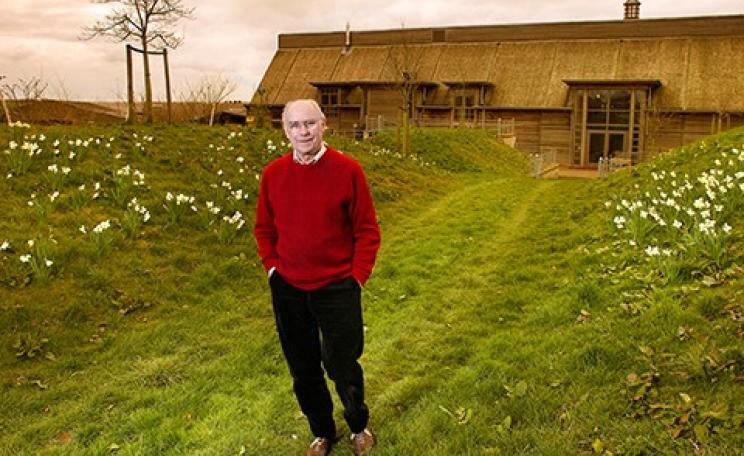If you were under the spotlight, in a quiz-type scenario, with the clocks ticking and were asked to name as many varieties of apples as possible in say, 20 seconds, how would you do?
On a recent TV quiz show a celebrity contestant was asked just that. She managed to name two. At first I was shocked but then I realised that if it had been me I'd have probably only got to five: Granny Smith, Braeburn, Pink Lady, Cox..., um..., Golden Delicious.... before running out of steam.
After years of just munching on the same old types, I can barely name a single rare variety.
Cut to the National Fruit Collection at Brogdale Farm in Kent a few weeks later and I'm walking round a vast orchard that's home to more than 2,000 varieties of apple.
Apples all around
There are small dark red apples that look like plums (Red Gold), big golden green apples that taste of pineapple (Ananas Reinette), rosy, aromatic apples that taste like a Cox but better (Malling Kent).
The air is filled with their scent of apples that are bulging from branches and scattered all over the damp grass.
I'm with Mike Austen, a cheery expert guide and we're weaving in and out of the rows of more than 4,000 trees (2 per variety).
It's not quite like the orchard I imagined it would be - the few orchards I've encountered had taller rambling trees and more space between them. In comparison these trees are in immaculate straight rows and no taller than 6 foot. 'It's the ideal size for gardens,' says Mike.
Every so often we stop, pick an apple and he tells me how each one came to be. The delicious, sweet, Malling Kent for instance is a Cox's Orange Pippin crossed with a Jonathan. Jonathan's popular progeny is a Jonagold (a Jonathan crossed with a Golden Delicious).
Mike says the flavoursome Cox is often used as a parent when crossing new varieties but it is prone to disease. Golden Delicious, tasteless as it may be, is another popular 'parent' as it's easy to grow.
Grow our own
He hasn't tried all 2,000 but the number is certainly ‘in the hundreds.' I later meet Joan Morgan, a fruit historian and pomologist and co-author of The New Book of Apples, a history of apples, from ancient times to present and a directory of all the varieties growing in the National Fruit Collection. She's tasted all the apples and cooked all the cooking apples.
'It's important in the UK that we grow more of our own fruit. At the moment I think it's something like 80 per cent is imported. It's outrageous,' she says.
The combination of supermarket buying power and cheap fruit from abroad has meant that since 1950 nearly two thirds of England's orchard area has disappeared.
The problem with modern fruit production, says Joan, is that we've lost a sense of seasonality. In an old fashioned garden system there were varieties that take you right through the season - from July to March. Now you can buy common varieties like Granny Smith or Golden Delicious all year round because of imports from the southern hemisphere.
Sea(sonal) change
Supermarkets want apples that travel well, keep the longest and are easiest to grow. 'A supermarket will buy from wherever it can get the best value, the best price, the best looking apples whether it's Washington State in America or France,' Joan laments.
There has been a sea change in the last few years with farm shops, farmers markets, small stores and even supermarkets starting to sell more English apples and varieties.
Then there is Apple Day, the annual celebration of apples, orchards and local distinctiveness initiated by Common Ground in 1990. It has since been celebrated each year by people organising hundreds of local events.
'It's been remarkable really,' says Common Ground co-founder Sue Clifford. 'We don't know how many apple days there are now. We stopped counting at 600 nearly 10 years ago.'
A day for apples
The whole point of the day was to create a calendar custom. As long as apples are 'queens of the day' anyone can organise an event from local authorities, charitable trusts and community orchards to botanic gardens, nurseries and cider makers.
There's no doubt the day has made a huge difference. 'No-one was talking about varieties when we started it. Now everybody's doing it,' says Sue.
Common Ground has also sparked a new trend for creating 'community orchards'.
'There wasn't such a thing before we invented them,' she points out, although she's keen not to take too much credit.
'It's not been us. We've just excited everybody else to do it for themselves. Now people are doing Apple Days who haven't even heard of us - it's spontaneous combustion.'
Apple Day has been so successful it's become more of an Apple Week: at Brogdale Farm the ‘Apple Festival' (17-18 October) is one of the highlights of the year. Visitors can taste and buy at least 200 varieties, get advice on growing fruit, drink cider, tour the orchard and watch cooking demos.
A rosy future?
Ultimately the importance of growing and buying different varieties of fruit goes beyond taste and novelty factor. It's about diversity. The National Fruit Collection at Brogdale Farm is largest collection of fruit trees and plants in the world. Along with apples it grows 550 varieties of pear, 350 of plum and 320 of cherry.
The Department for the Environment, Food and Rural Affairs (Defra) owns and funds the National Fruit Collection at Brogdale as part of its international obligations to protect plant genetic resources. The aim is to ensure that there are food crops for the future in the context of climate change. The genes are being researched and made available for future crops that will take less fossil fuel and pesticide to cultivate them (disappointingly, the collection is not organic).
One thing's for sure though, freshly picked and perfectly ripe is best. Every apple I tried at Brogdale tasted better than anything bought from a supermarket. Even if you don't have access to an apple tree near you there are other ways to expand your apple horizons (and vocabulary):
• Eat UK-grown apples in their season - from July to March
• Ask your greengrocer/farmers' market/local shop for particular varieties as they ripen
• Support growers who sell a good variety
• Organise a local Apple Day on 21st October
• Create a community orchard
• Learn to prune and graft
• Press your own juice
• Become an apple connaisseur
For more information:
To find an Apple Day event near you click here
The Apple Source Book: Particular uses for diverse apples by Sue Clifford and Angela King (£16.99, Hodder & Stoughton)
The New Book of Apples: The Definitive Guide to over 2000 Varieties by Joan Morgan and Alison Richards (£37.50 Ebury Press)
Laura Sevier is the Ecologist's Green Living Editor
See also:







